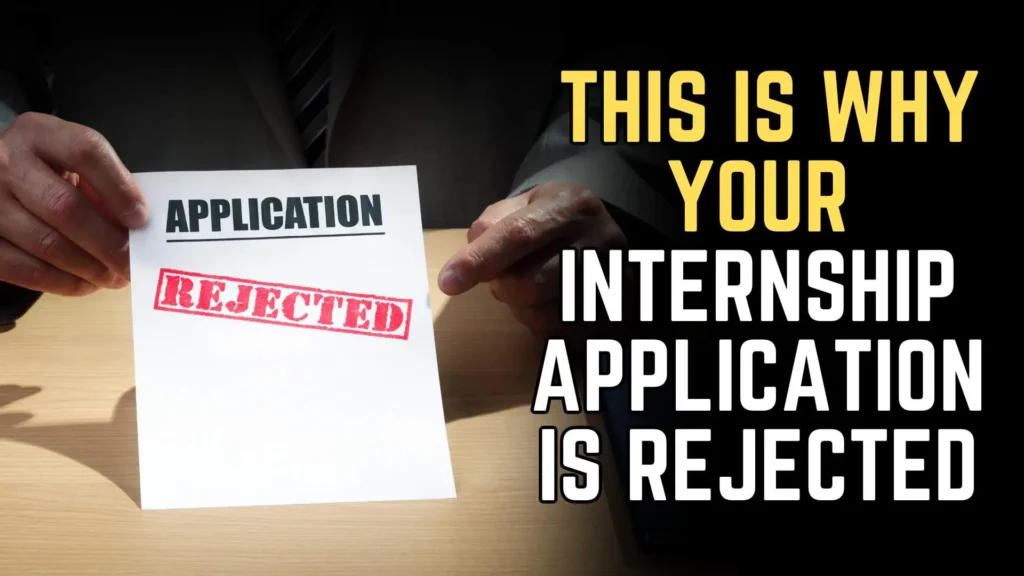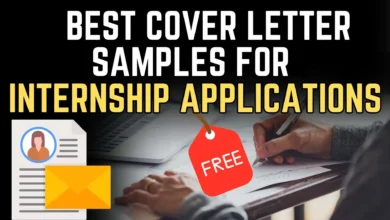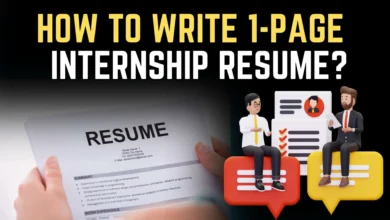10 Common Internship Application Mistakes and How to Avoid Them in 2024
Common Internship Application Mistakes
When applying for internships, there are several common internship application mistakes that can easily slip by, potentially costing you the opportunity. So, you’re ready to apply for internships, but let me tell you this—many students make the same mistakes over and over. It’s wild! Did you know that more than 50% of internship applicants get rejected due to small, avoidable errors in their application? It’s like having all the right skills and experience but tripping right before the finish line.

Whether it’s submitting generic resumes or forgetting to proofread, there are little things that can sabotage your chances without you even realizing it. The good news? These mistakes are easy to avoid once you know what to look for. Today, we’re going to dive into the most common internship application mistakes I’ve seen (and made myself—yep, guilty!), so you can skip the frustration and start applying like a pro!
1. How Submitting Generic Resumes and Cover Letters is One of the Most Common Internship Application Mistakes
Okay, let’s start with one of the biggest mistakes—sending out the same resume and cover letter to every internship. Trust me, hiring managers can spot a generic application from a mile away. I used to think that once I had the perfect resume, I could just copy and paste it into every job application. I learned the hard way that this isn’t how it works.
Why Generic Applications Don’t Work?
Employers want to know why you specifically want to work at their company and why you’re a great fit for that particular role. A one-size-fits-all resume doesn’t cut it anymore. Companies want to see that you’ve put in the effort to tailor your application. It shows initiative, attention to detail, and genuine interest.
Imagine this: You apply to a digital marketing internship and a finance internship with the same resume. Sure, you might have skills that apply to both, but each job values different skills and experiences. For the marketing role, they’ll want to see your creativity, content creation experience, or social media skills. The finance team, on the other hand, wants to know about your analytical skills or how well you handle Excel.
How to Customize Your Application
Customizing your resume isn’t as hard as it sounds. You don’t need to rewrite the whole thing from scratch for every application—just tweak it! Look closely at the job description. Are they looking for problem-solving skills? Leadership? Project management? Make sure these show up in your resume and cover letter.
Pro tip: If a company is looking for someone with a specific tool like Google Analytics, and you’ve used it, make sure that shows up on your resume. It’s all about connecting the dots for the hiring manager.
While not customizing your resume is one of the most common internship application mistakes, failing to highlight your relevant skills can be just as damaging.
Tailoring your resume and cover letter for each position is crucial. Overlooking this is one of the most common internship application mistakes that can cost you interviews.
2. Ignoring Application Instructions
This one drives me crazy because it’s such an easy fix—not following the application instructions. You know those guidelines that tell you to submit your resume in PDF format or to include a specific subject line? Yeah, those matter. One of the common internship application mistakes that applicants often make is ignoring the submission instructions.
Why Following Directions is Crucial?
Companies put these instructions in place for a reason, whether it’s to weed out candidates or simply to streamline the process. When you ignore them, it tells the employer two things: 1) You didn’t bother to read the details, and 2) You might not be great at following directions. Not the impression you want to leave, right?
Common Mistakes in Instructions
- File formats: Some companies specify a PDF or Word file for your resume. Submitting it in the wrong format can mean your resume doesn’t even get opened.
- Naming your files: Employers often ask you to name your files in a specific way, like “FirstName_LastName_Resume.” Sending a file named “MyResumeFinalVersion5” doesn’t look great.
- Submission deadlines: This is obvious, but missing deadlines is a quick way to get your application tossed in the trash.
How to Avoid These Mistakes?
Take a few minutes to double-check the instructions. It might sound boring, but this one little step can make a huge difference. Trust me, I once lost out on an internship because I sent in the wrong file format. Lesson learned!
Procrastination often leads to rushed, last-minute submissions, which is one of the most common internship application mistakes applicants make.
3. Failing to Highlight Relevant Skills and Experience
Another common pitfall is failing to highlight relevant skills. You might have a lot of experience, but if you’re not showing the right skills for the job you’re applying for, you’re missing the mark.
Connecting the Dots Between Experience and Skills
Even if you don’t have direct experience in the field, you probably have transferable skills that are highly valuable. For instance, let’s say you’re applying for a management internship but have only worked part-time jobs in retail. Guess what? Those retail jobs taught you a ton about customer service, problem-solving, and leadership. It’s all about framing it correctly.
I remember applying for a tech internship even though I hadn’t worked in tech before. Instead of focusing on my lack of experience, I highlighted the skills I’d learned from my school projects—like coding in Python and problem-solving through hackathons. Turns out, those were exactly the skills they wanted to see, and I got the interview!
How to Showcase Relevant Skills?
Look at the internship description and make sure your resume matches up. Are they asking for someone who’s organized? Include your project management experience. Looking for creativity? Talk about that blog you started or the social media campaign you ran. Don’t assume the employer will make the connection for you—you’ve got to lay it out clearly.
Pro tip: Use bullet points to make your skills stand out. It makes your resume easier to skim, and trust me, hiring managers appreciate that.
Not emphasizing transferable skills relevant to the role is another of the most common internship application mistakes that students overlook.
4. Submitting Late or Rushed Applications
Oh boy, this one’s a classic. I can’t tell you how many times I’ve seen friends (or, uh, me) wait until the last minute to submit an internship application. You’re scrambling, typing furiously, and double-checking everything at the last second. But here’s the thing: when you rush, mistakes happen.
The Dangers of Last-Minute Applications
First off, you’re more likely to make errors when you’re in a hurry. Whether it’s a typo, a missed attachment, or a half-finished sentence, these small errors can make a bad impression. Plus, submitting late can sometimes mean missing out on the opportunity entirely. Some companies review applications on a rolling basis, so if you wait too long, they might already be finalizing candidates.
Time Management Tips for Internship Applications
So how do you avoid the last-minute rush? Create a timeline for your applications. If the deadline is in two weeks, aim to finish it in one. This gives you extra time to review and make sure everything is polished. I started doing this, and trust me, it made the process a lot less stressful.
Another tip is to create a basic resume and cover letter template early in your search. That way, when you find an internship you’re excited about, you’re not starting from scratch—you just need to customize it for the role.
5. Overlooking the Power of Networking
Now let’s talk about networking. This is one of those areas where people often think, “I’ll just apply online. That’s enough, right?” Nope. One of the biggest mistakes you can make is relying solely on online applications. Networking can make all the difference.
Why Networking is Key?
Here’s the reality: many internships aren’t even advertised. According to a survey from Jobvite, 85% of jobs are filled through networking. Companies love referrals, and knowing someone inside a company can be the difference between your resume being read or ignored.
I used to think I didn’t know anyone in the industry, but then I realized my university had an alumni network that was super helpful. I started reaching out to people on LinkedIn, attending career fairs, and even asking professors for introductions. It worked! I ended up getting an internship through an alum who gave me a recommendation after a simple coffee chat.
How to Build a Network?
Start by connecting with your university alumni, professors, or people you meet at career events. Don’t be afraid to send a LinkedIn message introducing yourself. It doesn’t have to be formal—just something like:
“Hi [Name], I’m a [Your Major] student at [University] interested in [industry]. I came across your profile and saw that you work at [Company]. Would you be open to a quick chat about your experience? I’d love to learn more about the industry.”
People are usually more willing to help than you think!
One of the common internship application mistakes is relying only on online applications and ignoring the power of networking, which can significantly boost your chances.
6. Ignoring the Importance of Soft Skills
Here’s another one that doesn’t get enough attention: soft skills. Many people focus entirely on technical skills, which are important, of course, but soft skills can set you apart.
Why Soft Skills Matter
Internships are as much about learning how to work in a professional environment as they are about the specific tasks you’ll be doing. Employers want to know that you’re not just technically capable but that you’ll work well with others, communicate effectively, and handle responsibility.
In a survey from LinkedIn, 92% of hiring managers said soft skills were just as important as hard skills when evaluating candidates. Things like communication, teamwork, and problem-solving are highly valued, but they’re often overlooked on resumes.
How to Highlight Soft Skills
The trick is to weave your soft skills into your experiences. Did you lead a team project at school? That’s leadership. Did you resolve conflicts during group work? That’s conflict resolution. It’s all about framing your experiences in a way that showcases both hard and soft skills.
For example, instead of just saying, “Managed a group project,” you could say, “Led a team of four to complete a group project, ensuring clear communication and conflict resolution throughout the process.” See the difference? It’s subtle, but it shows that you’ve got the soft skills employers are looking for.
7. How Not Proofreading Your Application is One of the Most Common Internship Application Mistakes
I can’t stress this enough: proofread your application. It’s one of the easiest mistakes to avoid, yet so many people skip it.
How Typos Can Ruin Your Chances
A typo here and there might not seem like a big deal, but it’s all about first impressions. If your resume or cover letter has spelling mistakes, grammar errors, or formatting issues, it sends a message that you didn’t care enough to check your work. It’s one of those things that could easily cost you an interview.
According to a report by CareerBuilder, 58% of hiring managers said typos on resumes were a top reason for rejecting candidates. Yikes.
Best Proofreading Practices
Here’s what I do: After I finish writing, I walk away for a bit. When I come back with fresh eyes, I’m way more likely to catch mistakes I didn’t see before. Another trick is to read your resume out loud. It sounds silly, but it works. You’re more likely to spot awkward phrasing or missing words.
Finally, if you can, have a friend or family member look it over. Sometimes another set of eyes will catch something you missed.
8. Focusing Too Much on Grades
I get it—grades are important, but here’s the thing: internships aren’t just about your GPA. In fact, many employers value practical experience and skills over perfect grades. So, if you’ve got a lower GPA, don’t sweat it too much.
Grades vs. Experience
While some industries (like finance or law) may put more weight on your GPA, for most internships, it’s about how well you can apply what you’ve learned. Employers want to see that you’re proactive, that you’ve done projects, worked on teams, or taken on challenges outside of the classroom.
I’ve seen people with lower GPAs land amazing internships because they had real-world experience—whether it was a part-time job, a volunteer project, or a leadership role in a student organization. It’s all about showing that you can take initiative and get results.
How to Balance Grades and Experience?
If your GPA isn’t stellar, focus on your accomplishments. Did you lead a club? Start a side project? Volunteer in your community? Highlight those experiences in your resume and cover letter. Trust me, companies want to see more than just numbers.
If your grades are good, great—mention them, but don’t rely on them alone to sell yourself.
9. Being Too Modest or Too Overconfident
This one’s tricky—finding the balance between confidence and modesty. It’s easy to either undersell yourself or come off as arrogant.
Finding the Right Balance
Being too modest can hurt your chances because you’re not showcasing your skills and achievements fully. On the other hand, being too overconfident can make you seem arrogant and hard to work with.
I used to struggle with this too. I didn’t want to seem like I was bragging, so I’d downplay my accomplishments. But then, I wasn’t really doing myself justice! The key is to present your achievements confidently, but let the work speak for itself.
How to Present Your Accomplishments
Instead of saying, “I’m great at project management,” show it by saying, “Successfully led a team of five to complete a complex project within tight deadlines.” You’re stating the facts, not bragging.
Similarly, avoid phrases like, “I know everything about social media marketing.” Instead, say, “I have experience managing social media campaigns across multiple platforms.” It’s about showing what you’ve done, not just saying you’re the best.
10. Neglecting Follow-Up After Submitting the Application
Finally, one of the biggest mistakes people make is not following up after submitting their application. I know, it feels awkward, but following up can be a game-changer.
Why Follow-Up is Important
Think about it: employers get tons of applications. Following up shows that you’re genuinely interested in the role and helps keep your application top of mind. In fact, according to a Robert Half survey, 80% of hiring managers said they appreciate follow-up emails because it shows initiative.
How to Follow-Up Professionally
Keep it short and sweet. After about a week or two, send a polite email like this:
“Hi [Hiring Manager’s Name],
I hope you’re doing well. I wanted to follow up on my application for the [Internship Title] position. I’m very excited about the opportunity to work with [Company Name] and would love the chance to discuss how my skills and experiences align with the role.
Thank you for your time and consideration!
Best regards,
[Your Name]”
Simple, right? It shows enthusiasm without being pushy.
Sample Resume with Mistakes
John Doe
[Phone Number]
[Email Address]
LinkedIn: JohnDoe12345
Objective:
Seeking an internship to develop my skills in various fields and gain experience in a professional setting.
Education:
Bachelor of Arts in Business
University of Nowhere
GPA: 2.9
Expected Graduation: 2024
Experience:
Sales Associate
RetailMart | 2022-Present
- Handled customer interactions
- Stocked shelves
- Managed inventory
Skills:
- Communication
- Leadership
- Microsoft Office
- Social media
Projects:
- Marketing Project: Worked on a group project where we came up with a marketing strategy for a fake company.
- Website Design: Created a basic website for a school project using WordPress.
Achievements:
- Won a certificate of participation in a debate competition.
- Attended a leadership seminar.
Common Mistakes in the Sample Resume:
- Generic Objective Statement:
- The objective is too vague and doesn’t indicate the specific skills or role John is targeting.
- Low GPA Highlighted Unnecessarily:
- A 2.9 GPA doesn’t add value to the resume and could hurt the applicant’s chances. Better to omit it if it’s not impressive.
- Job Descriptions Lack Detail and Achievements:
- The experience section lacks quantifiable results and specific details on what John achieved in his role. “Handled customer interactions” doesn’t showcase any standout skills or accomplishments.
- Skills Section is Too Broad:
- Skills like “Communication” and “Leadership” are important, but they need context. Additionally, “Microsoft Office” and “Social media” are too basic without specific software or platforms mentioned.
- Weak Descriptions in Projects:
- The project descriptions are generic and lack clear outcomes or impact.
- Achievements are Insignificant:
- Including a participation certificate and simply attending a seminar doesn’t add value. It’s better to focus on meaningful achievements.
Corrected Version
John Doe
[Phone Number]
[Email Address]
LinkedIn: linkedin.com/in/johndoe123
Objective:
Detail-oriented and highly motivated Business major seeking a Marketing Internship to leverage skills in digital marketing, content creation, and social media strategy. Passionate about using data analytics to drive brand growth.
Education:
Bachelor of Arts in Business
University of Nowhere
Expected Graduation: 2024
Relevant Coursework:
- Marketing Analytics
- Digital Media Strategies
- Consumer Behavior
Experience:
Sales Associate
RetailMart | 2022-Present
- Increased monthly sales by 15% through upselling techniques and personalized customer service.
- Managed a team of 4 to redesign store layout, leading to a 10% increase in product visibility and higher sales.
- Assisted in inventory management, reducing stock errors by 20% through a new digital tracking system.
Skills:
- Digital Marketing (Google Analytics, SEMrush)
- Content Creation (Adobe Photoshop, Canva)
- Data Analysis (Excel, Power BI)
- Social Media Strategy (Facebook, Instagram, Twitter)
- Strong Communication and Team Collaboration
Projects:
Marketing Campaign for Local Business
- Developed a digital marketing strategy for a local restaurant, leading to a 25% increase in social media engagement within 2 months.
- Created promotional materials using Canva and Adobe Photoshop, targeting the restaurant’s key demographics.
Website Redesign for Student Organization
- Led the redesign of a website for the university’s business club, improving navigation and increasing user engagement by 30%.
- Integrated WordPress plugins to enhance functionality, such as event sign-ups and member directories.
Achievements:
- Awarded “Top Performer” recognition at RetailMart for achieving the highest customer satisfaction score for three consecutive months.
- Organized a university-wide seminar on digital marketing trends, attracting over 100 attendees and 10 guest speakers.
Corrections Explained
- Objective Statement:
The revised objective is specific, targeting a marketing internship and emphasizing relevant skills like digital marketing, content creation, and data analytics. This tells the employer what John brings to the table right away. - Education Section:
The low GPA has been removed, which avoids drawing attention to something that might hurt the application. Instead, relevant coursework has been added to showcase John’s preparation for a marketing internship. - Detailed Job Descriptions with Achievements:
Instead of listing generic tasks, John’s work as a Sales Associate now includes quantifiable results: increased sales by 15%, reduced stock errors by 20%, and led a team. These specific achievements make his experience more compelling. - Skills Section:
Now, the skills section is more targeted and specific. Instead of generic terms like “social media,” John lists particular platforms and software (Google Analytics, SEMrush). These tools are valuable in marketing and show that John has hands-on experience with relevant tools. - Stronger Project Descriptions:
The project descriptions now show clear outcomes and use numbers to demonstrate success. For example, John’s marketing campaign increased social media engagement by 25%, and his website redesign improved user engagement by 30%. These results show that John has successfully applied his skills in real-world situations. - Achievements:
John’s achievements now focus on more meaningful recognitions like being awarded “Top Performer” at work and organizing a seminar, which demonstrate leadership, initiative, and professional recognition.
Key Takeaways for Correcting Resume Mistakes
- Tailor your objective: Be specific about the role and the skills you’re bringing.
- Quantify achievements: Numbers and percentages make your contributions stand out.
- Avoid focusing on weak areas: If your GPA is low, leave it out, and highlight other strengths.
- Be specific with skills: Name relevant tools and platforms instead of using vague terms.
- Show results: Whenever possible, use numbers or percentages to quantify your success in projects or jobs.
By addressing these common resume mistakes and focusing on making each section as specific and results-driven as possible, you’ll make a much stronger impression on potential employers.
Conclusion
By avoiding these common internship application mistakes, you’ll increase your chances of landing your dream internship. Landing an internship takes more than just applying—it’s about applying the right way. Avoiding common mistakes like ignoring instructions or submitting generic applications can set you apart from the competition. Take the time to tailor each application, highlight your strengths, and follow up! It’s all about making a lasting impression.
And remember, this process isn’t just about landing the internship—it’s about learning how to market yourself, network effectively, and build the skills you’ll need for your career. Ready to ace that internship application? Share your own tips or experiences in the comments!




